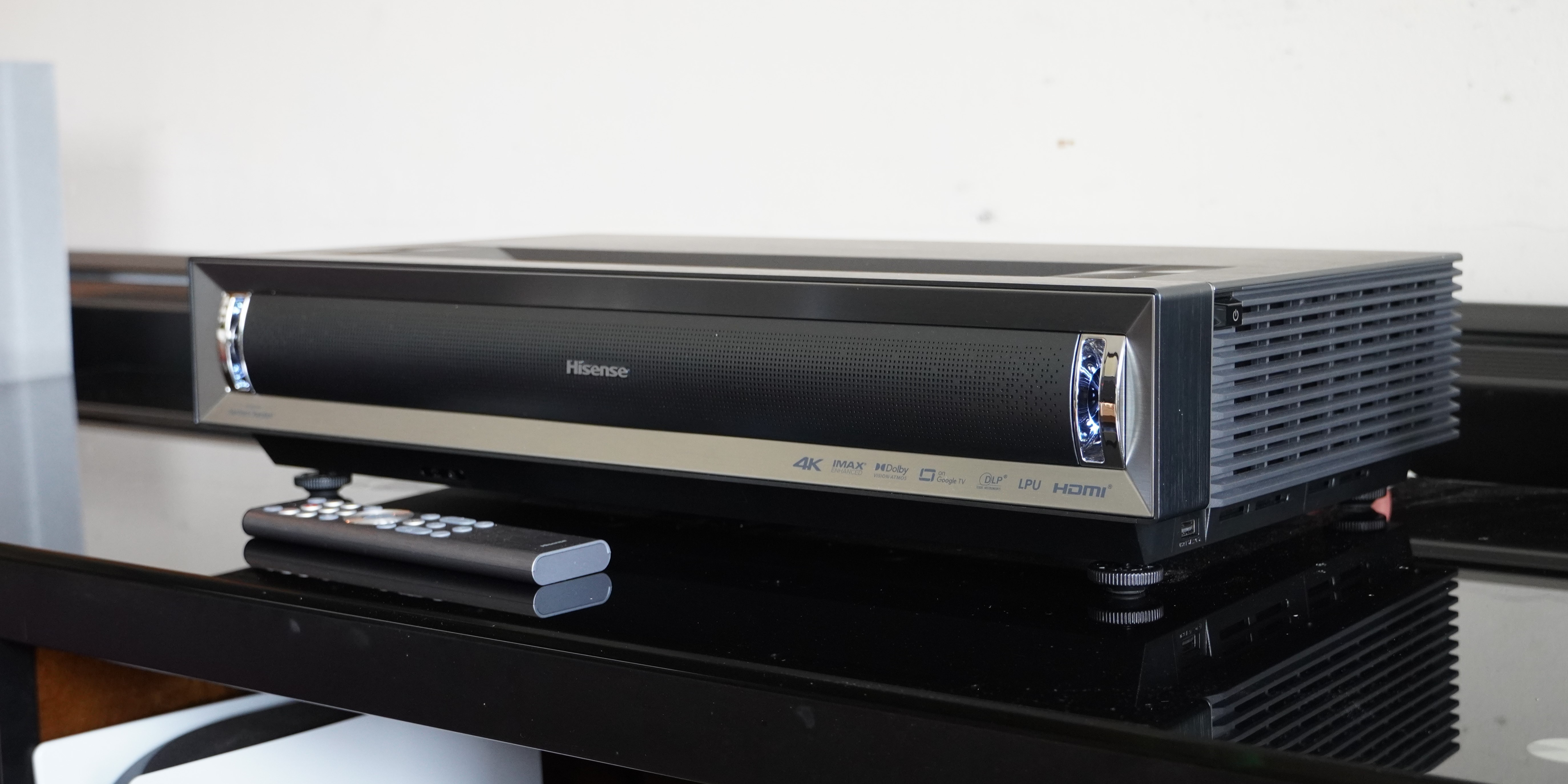TechRadar Verdict
The Hisense PX3-Pro is a worthy successor to its PX2-Pro predecessor. Its upgraded brightness is a big benefit and helps make its stunning color enjoyable in various room lighting conditions. Gamers also get a huge upgrade with its new 240Hz mode.
Pros
- +
Bright, colorful images
- +
240Hz mode for smooth gameplay
- +
Versatile and flexible
Cons
- -
Pricey
- -
Powerful speakers, but little Atmos effect
Why you can trust TechRadar
Hisense PX3-Pro: two-minute review
Hisense has been has been responsible for some of the best ultra short throw projectors, and the Hisense PX3-Pro is among its latest. The PX3-Pro has a daunting task following up on the Hisense PX2-Pro, but Hisense has pulled it off with some key upgrades.
The new Hisense PX3-Pro differs in design from the PX2-Pro, but under the hood, it gets an upgraded projection system that’s much brighter at 3,000 lumens and also boasts a 1080p/240Hz mode. This feature turns it from an exceptional ultra short throw (UST) projector into a speed demon of a gaming projector – Hisense even bills it as the "world's first designed for Xbox UST projector." And with rich color, strong contrast, and Dolby Vision HDR support, the PX3-Pro ranks up there with the best 4K projectors when it comes to picture performance.
While the PX3-Pro’s built-in sound isn’t quite as impressive as its picture, it at least has the volume level to match the visuals, and Hisense offers plenty of ways to connect to better speaker systems. All of this comes at a higher price than its predecessor, but it seems well worth the extra expense.
Hisense PX3-Pro review: price and release date
- First available: September 2024
- Price: $3,499 / £2,499
The Hisense PX3-Pro started shipping in September exclusively from ProjectorScreen.com in the US, with more general availability to follow later in 2024. It is priced at $3,499 / £2,499, a marked increase over the lower brightness PX2-Pro, which launched at $2,999 in June 2023. Like the rest of the Hisense PX series, the PX3-Pro doesn’t come with a projection screen.
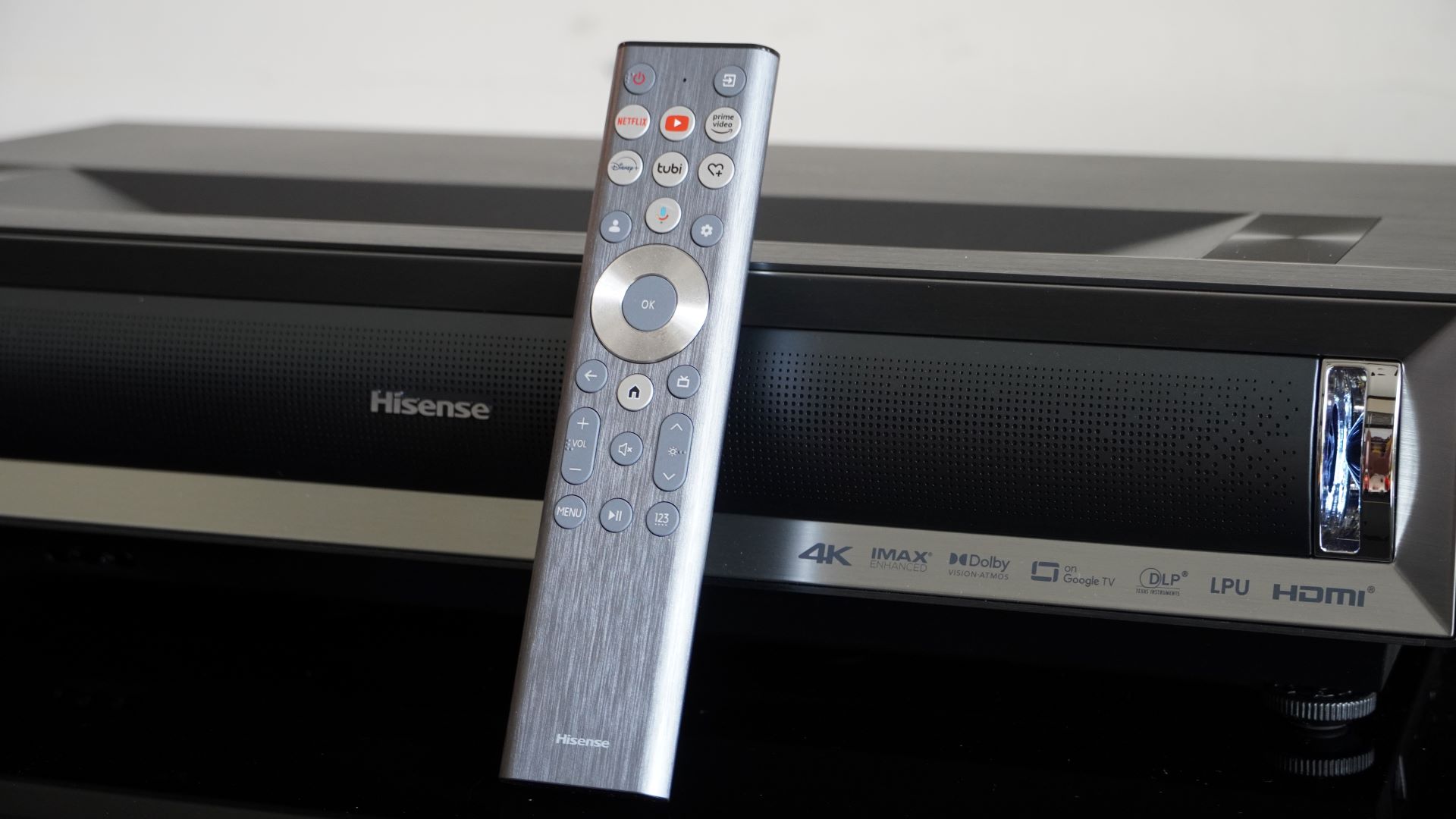
Hisense PX3-Pro review: Specs
| Screen sizes supported: | 80-150 inches |
| Brightness (specified): | 3,000 Lumens |
| HDR support: | Dolby Vision, HDR10+, HDR10, HLG |
| Optical technology: | 3-laser DLP |
| Smart TV: | Google TV |
| Connections: | 2x HDMI 2.1, 1x HDMI 2.0 with eARC, optical digital audio out, 3.5mm audio out, 2x USB-A, Ethernet |
| Dimensions: | 21.7 x 11.7 x 4.8 inches (55 x 30 x 12.2cm) |
| Weight: | 19.8 pounds (9 kg) |
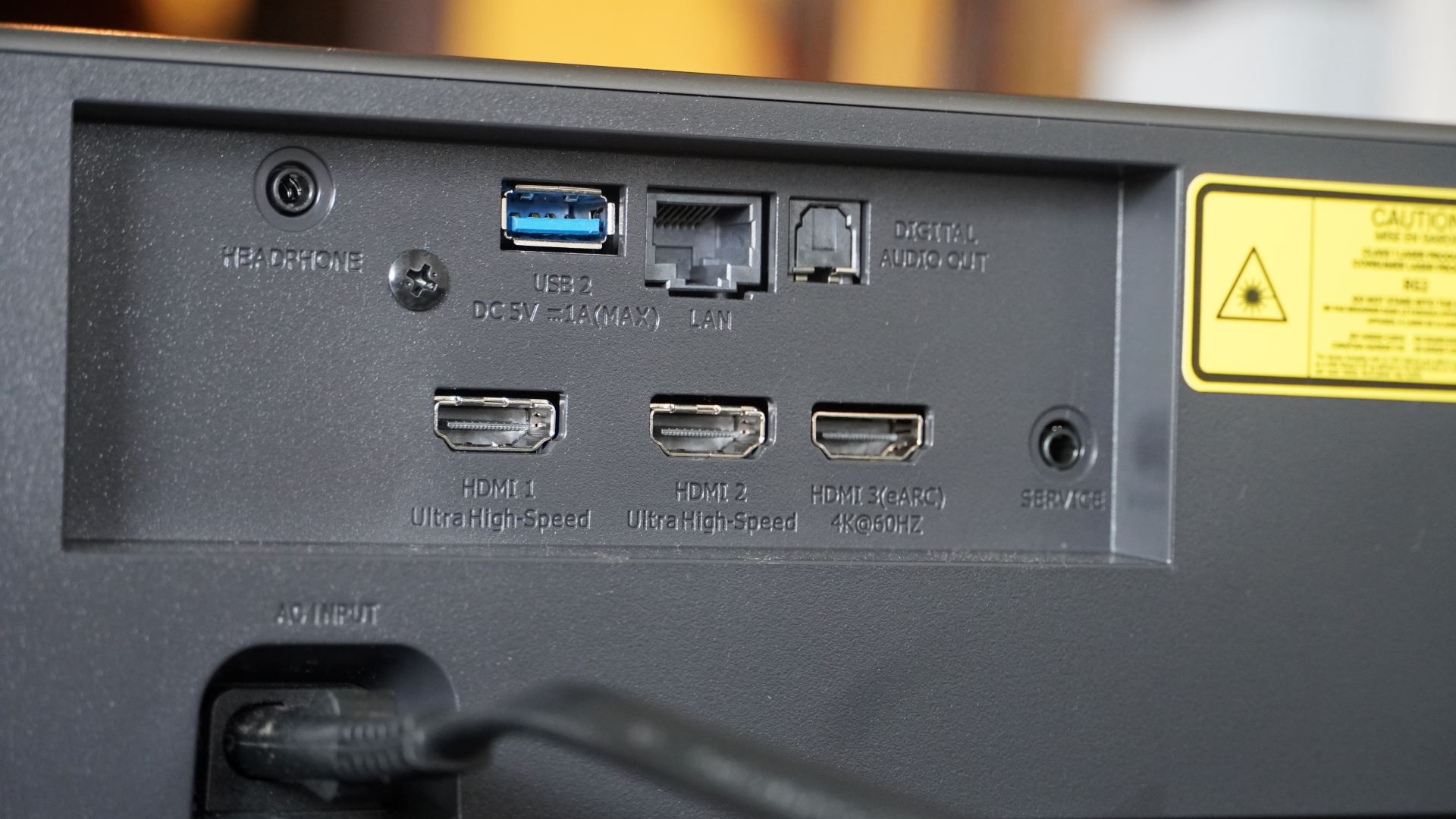
Hisense PX3-Pro review: design and features
- Futuristic-looking design
- All-in-one capability plus flexibility for different setups
- Streaming and gaming benefit from hardware and software upgrades
Where the Hisense PX2-Pro was a simple under-the-hood refresh of its predecessor, The PX1-Pro, the new PX3-Pro sees some bigger changes both to its internal components and its outward appearance. The design has a stylistic resemblance to its predecessors, but it gives off more of a proper futuristic vibe than the prior models with their retro-futuristic looks.
The whole unit is done up in gray and silver surfaces of all types: matte, shiny, smooth, and coarse. It features large grilles on either side for air intake and exhaust – generating 3,000 lumens creates some heat even when using lasers. The front also gets a perforated grille for the built-in speakers. At either side of the grille are vertical slots in shiny housing that have standby lighting built in, so when the projector is turned off, these illuminate the mirrored finish inside. This may appeal to some, but I found it a little tacky compared to the PX2-Pro’s subtler design.
Style aside, perhaps the most critical design change is the projector’s size. It’s a little wider and taller than its predecessors, but not as deep front-to-back. That combined with a shift from a 0.25:1 throw ratio to a 0:22 throw ratio means the PX3-Pro can sit closer to a wall, protruding into the room less, and still provide a massive picture.
The PX3-Pro sits on four height-adjustable feet, which helps get the picture aligned with a screen. It also offers digital image correction and adjustable focus, letting you dial in everything perfectly.
Around the back, you’ll find three HDMI ports, including one with eARC. There’s also a high-speed USB type-A port (and another on the right side), and both and optical digital and 3.5mm audio output. With Google TV onboard, the PX3-Pro can tap into plenty of streaming services, including Netflix, and has both Wi-Fi 6E and Ethernet network connections.
The Hisense PX3-Pro has comprehensive high dynamic range support, including Dolby Vision and HDR10+. Its built-in speakers support Dolby Atmos and IMAX Enhanced for DTS, though audio is best passed on to an outboard sound system. Unlike its predecessors, the PX3-Pro offers Active 3D support (requires optional 3D eyewear).
There are still a few features the PX3-Pro could have benefitted from. Optical image adjustments beyond focus would be a welcome addition, especially zoom, though I’ve never seen that feature in a UST projector. A cover would be a more reasonable one, as dust can gather quickly on top of UST projectors.
- Design and features score: 4.5/5

Hisense PX3-Pro review: picture and sound quality
- Exceptional color and brightness
- Crisp 4K picture with comprehensive HDR support
- 240Hz mode is a perk for gamers
The Hisense PX3-Pro builds on a strong picture quality foundation. The PX2-Pro offered stunning color from its tri-chroma projection system and the PX3-Pro takes that up a notch with a notably brighter picture, rated to reach 3,000 lumens. For some content, like cartoons and sports, that’ll make a very presentable picture even with high ambient room lighting. It also gives the PX3-Pro plenty of latitude in dim lighting conditions, with a bright enough picture that it can call for some dimming of the laser in a dark room.
While the projector has powerful contrast as is, a High Dynamic setting for Laser Luminance can further enhance its picture. I’m normally wary of settings like this that adjust the picture based on the content being displayed as they tend to have noticeable artifacts, but the PX3-Pro managed it admirably, with imperceptible transitions. The only odd behavior I noted was a sudden brightening when white subtitles appeared onscreen during dark scenes. Otherwise, this played out well for Guy Ritchie’s Sherlock Holmes, helping to punch up the bright scenes while avoiding pumping up black levels in dark ones.
The PX3-Pro’s comprehensive HDR support made the latest seasons of The Rings of Power in HDR10+ and The Avengers: Endgame in Dolby Vision both look fantastic. The wide color gamut of the triple-laser projection system played a big part in this, giving the PX3-Pro simply astounding color. One downside of this is that rainbows, a regular artifact of DLP technology, can seem a little more pronounced.
The PX3-Pro serves up a big, bright 4K picture ranging from 80 to 150 inches. While it’s possible to project images beyond these sizes, the focus range is limited and you may end up with a softer image.
For gamers, the Hisense PX3-Pro has something extra special in store. In addition to simply switching to a game mode with lower input lag, the projector can swap over to a 1080p/240Hz mode. This sacrifices some picture detail but provides buttery smooth visuals, and the DLP system has minimal ghosting. The gameplay is highly responsive and a big perk. Though the projector will also display 4K 120Hz signals, it doesn’t appear to display every frame but rather skips every other one as checked with Blur Busters’ frame skipping tool.
Audio on the PX3-Pro isn’t half-bad either. Its 50W Harman Kardon-designed speakers can get loud enough to match the size of the pictures the PX3-Pro projects, and the sound has an impressive range with booming bass, though it doesn’t get deep into sub-bass territory. What it really lacks is the spatial aspect. The stereo separation isn’t very wide, and there are no side, rear, or height channels. This means that even though the projector supports Dolby Atmos and Imax Enhanced for DTS, it’s best used with external speakers.
- Picture and sound quality score: 4.5/5
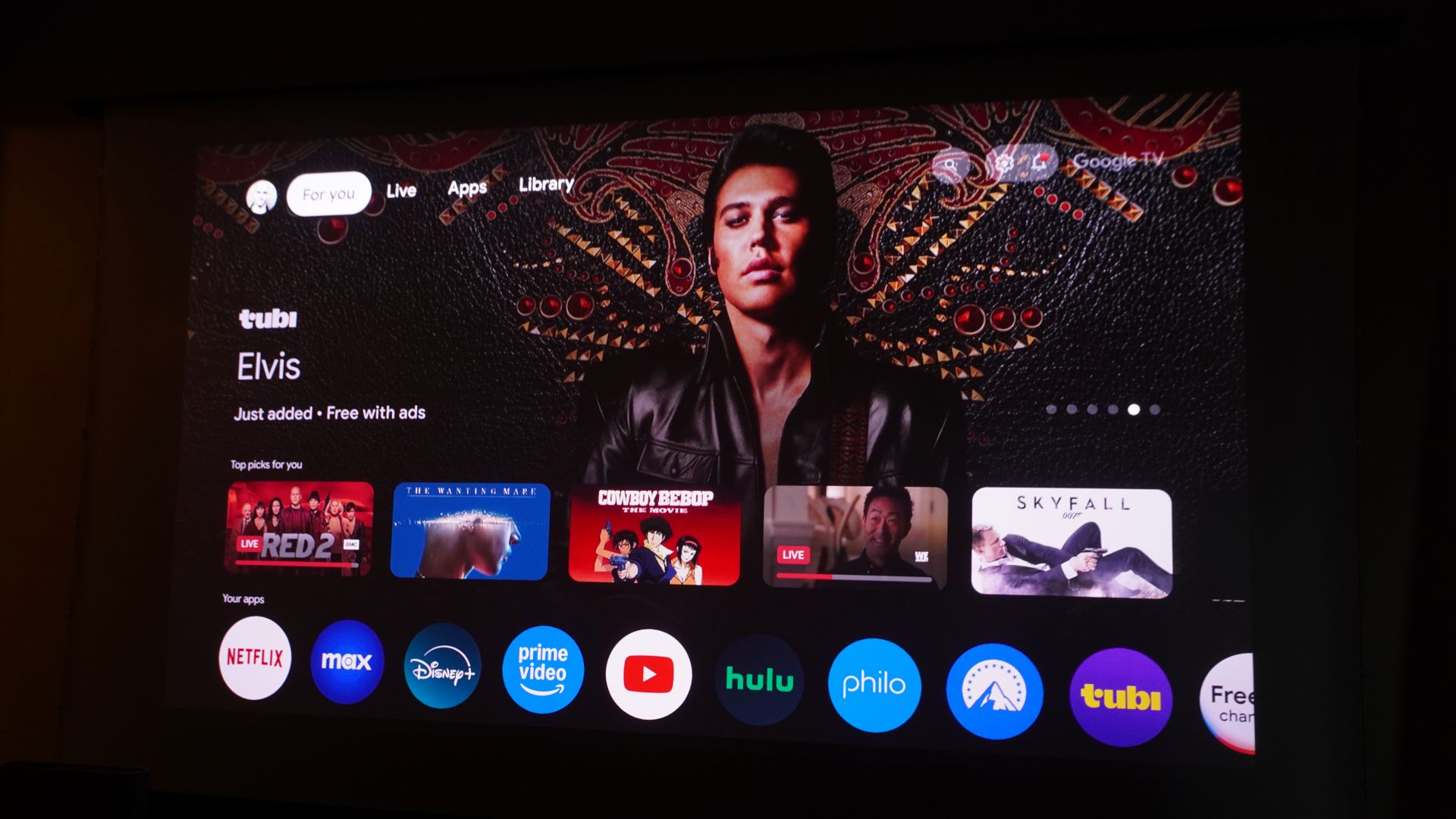
Hisense PX3-Pro review: value
- High price but a compelling picture
- Versatility adds to its value
The Hisense PX3-Pro doesn’t come cheap at $3,499. Its price puts it a ways above its predecessor and sets it up against others like the Epson Home Cinema LS800. It also raises the question of whether you should instead opt for a big TV since you can get an 83-inch OLED like the LG C4 for not too much more.
But the PX3-Pro brings a lot to the table. It has enough brightness and detail to comfortably stretch its 4K picture to massive proportions. The PX3-Pro also supports 3D content and a wide range of HDR formats, has a 240Hz refresh rate mode, and has Google TV built-in (with a fast enough processor to run it smoothly). There’s little question that the PX3-Pro UST offers a lot, and it’s a worthy rival to TVs and other projector types.
- Value score: 4.5/5
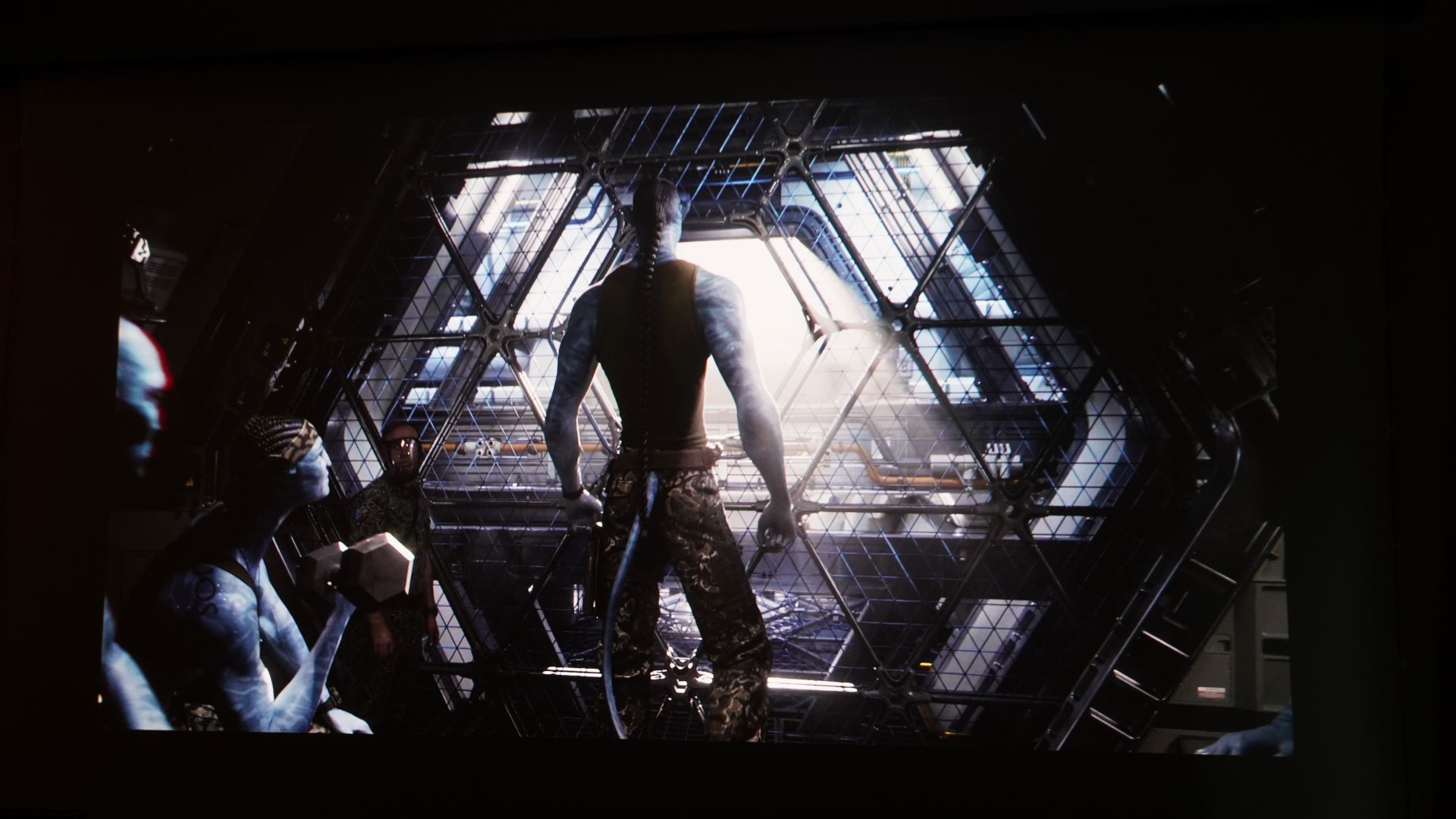
| Row 0 - Cell 0 | Notes | Rating |
| Design and features | An impressively compact all-in-one package that’s versatile enough to work with all sorts of external home theater hardware | 4.5/5 |
| Picture & sound quality | Color gamut stands out, and the extra brightness alongside wide HDR support makes for visually stunning images. It’s \no match for a sun-drenched room, but excels in dim and dark ones. | 4.5/5 |
| Value | It’s not cheap but offers great picture quality, features, and a high level of versatility for the money. | 4.5/5 |
Should I buy the Hisense PX3-Pro?
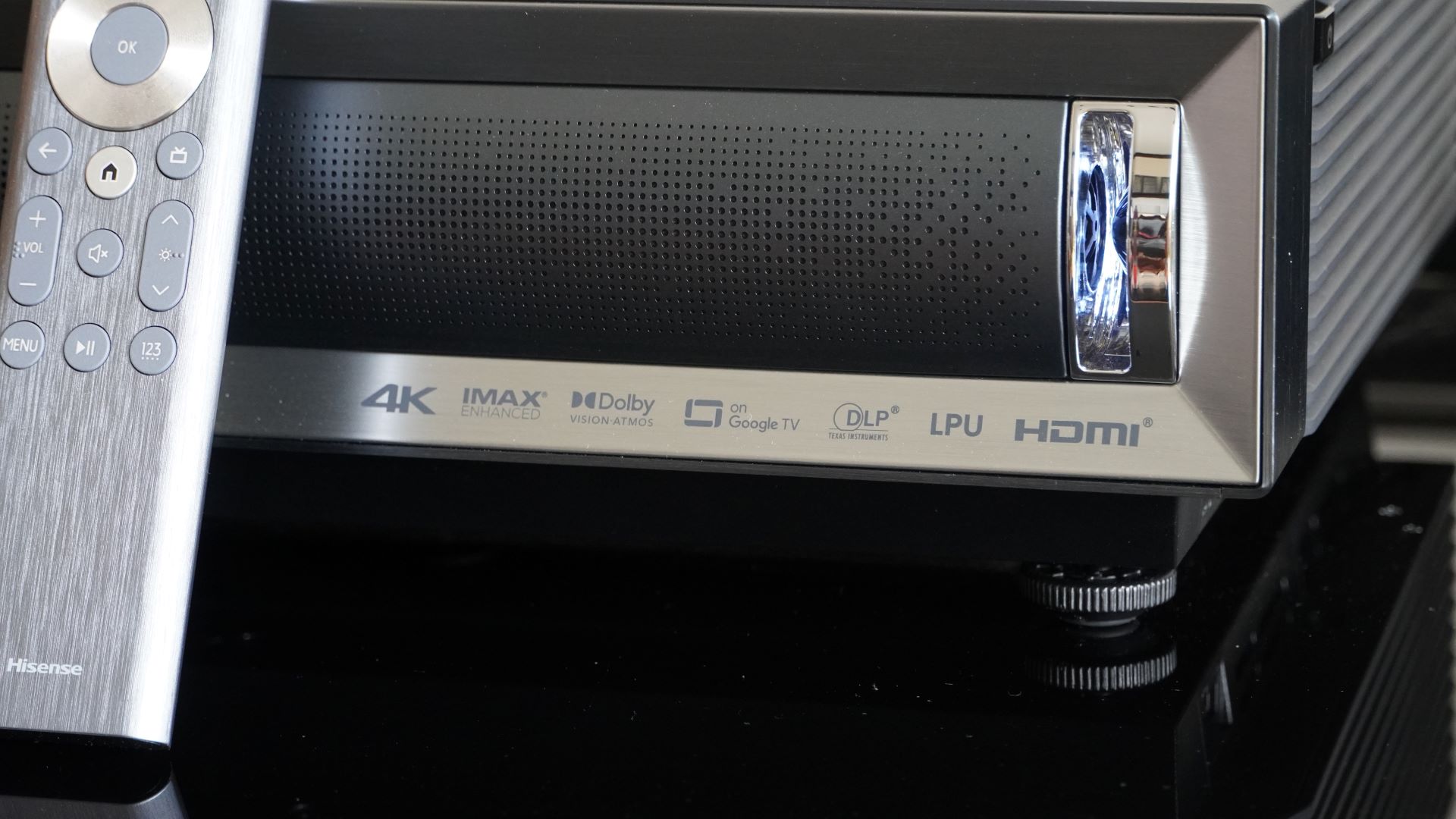
Buy it if...
You want a versatile UST projector: The PX3-Pro handles multiple HDR formats, has Google TV, and supports different picture sizes. If you want flexibility, this projector has it.
You want to game: While other UST projectors max out at 60Hz, the PX3-Pro steps it up in the refresh rate department and the difference is unmistakable when it comes to fast-paced gaming.
You want stunning color: The triple-laser light source Hisense has been working with is top-notch, making systems that only promise 100% DCI-P3 coverage seem like they’re skimping.
Don’t buy it if…
You plan to only watch in a bright room: The Hisense PX3-Pro can work in brighter conditions, but any projector will struggle in a bright room because the black levels can only get as low as the room allows. If you expect to do mostly bright-room viewing, the Epson LS800 is better up to the task.
You regularly watch movies in the dark: The Hisense PX3-Pro’s big upgrade is its extra brightness and extra gaming speed. But some other UST projectors cost less and are still absolutely fantastic for viewing in dark home theater rooms.
You’re not after the big-screen experience: The Hisense PX3-Pro, like other projectors in its class, are suited to home theater setups that are grand in scale. If you’re fine with a display below 85 inches, you may be better off with a TV like the LG C4 OLED.
Also consider...
| Hisense PX3-Pro | Hisense PX2-Pro | Epson LS800 | Hisense L9G | |
|---|---|---|---|---|
| Price: | $3,499 | $2,999 | $3,499 | $5,499 |
| Screen sizes supported: | 80 to 150 inches | 90 to 130 inches | Up to 150 inches | 100 inches |
| Brightness (specified): | 3,000 lumens | 2,400 lumens | 4,000 lumens | 3,000 lumens |
| HDR support | HDR10+, HDR10, HLG, Dolby Vision | Dolby Vision, HDR10, HLG | HDR10, HLG | HDR10, HLG, Dolby Vision |
| Optical technology: | 3 laser DLP | 3 laser DLP | Laser 3LCD | 3 laser DLP |
| Smart TV: | Google TV | Google TV / VIDAA | Android TV | Android TV |
| Connections: | 2x HDMI 2.1, 1x HDMI 2.0 (1 with eARC), optical, 3.5mm | 2x HDMI 2.0 (1 with ARC), HDMI 2.0 | 3x HDMI 2.0 (1 with ARC) | 2x HDMI 2.1, 1x HDMI 2.0 (with eARC), 1x RF, optical |
Hisense PX2-Pro
The Hisense PX2-Pro, the PX3-Pro's still-available predecessor. has lower brightness but currently costs at least $1,000 less. It's not as great an option for gaming, but it does come with the Google TV smart interface for streaming and voice control.
Read our full Hisense PX2-Pro review
Epson LS800
The Epson LS800 uses a 3LCD laser light source to beam a stunningly bright 4,000 lumens image. This makes it a great option for daytime sports viewing and it also has good built-in sound.
Read our full Epson LS800 review
Hisense L9G
If you know you’re planning to get a dedicated ALR screen, the Hisense L9G, which comes with one, may make more sense. It has the same brightness at 3,000 lumens, its color is also excellent, and it supports Dolby Vision. Also, its 40W sound system is a beast in its own right.
Read our full Hisense L9G review.

How I tested the Hisense PX3-Pro
- Tested at home in multiple, real-world viewing conditions
- Presented the display with a variety of media and formats
- I have tested numerous projectors and displays over the last half-decade
I tested the Hisense PX2 Pro at home, in real-world conditions. This saw it faced with ambient light coming in from numerous windows, in-room lighting, as well as ambient noise that both the projector and speaker systems had to overcome. The projector was tested both against a bare, white wall and an Akia Screens CineWhite screen. It was presented with standard definition and 4K HDR streamed content, and PC gameplay.
My testing evaluates the projector’s performance with respect to its price and competition from other models I and colleagues at TechRadar have tested.
I have been testing projectors since 2021 and displays for even longer.
I measured the Premiere 9’s input lag in milliseconds using a Leo Bodnar tester with the low latency mode switch on.
First reviewed: September, 2024
Over the last several years, Mark has been tasked as a writer, an editor, and a manager, interacting with published content from all angles. He is intimately familiar with the editorial process from the inception of an article idea, through the iterative process, past publishing, and down the road into performance analysis.
